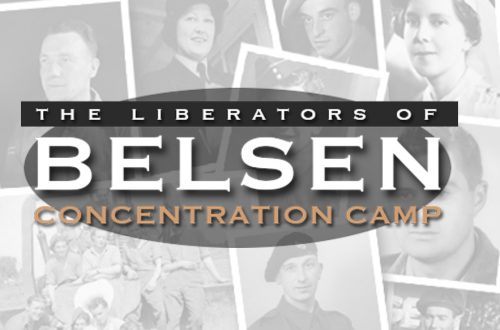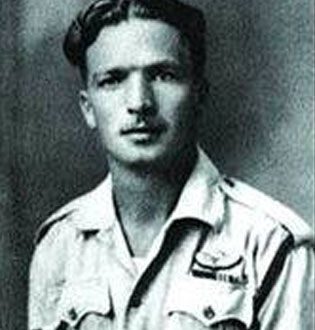Reg McDonnell – Royal Engineers
As the cold water of the English Channel lapped at his chest, a soldier near to Reg McDonnell stumbled and began to drown under the weight of his equipment.
After fighting to right his comrade they and hundreds of others continued to march towards a French beach where the German Army was waiting.
Still in his teens, Reg faced machine gun fire and saw another friend blown up by a mine before he had even made it across the sand at Gold beach.
Reg, who signed up to the Royal Engineers in 1941 when he was just 16, later helped care for inmates following the liberation of the notorious Belsen concentration camp.
It is thought he is one of the youngest servicemen to take part in the D-Day landings, which took place 73 years ago today. His memories, which he had kept secret for years, were revealed during a recent hospital stay.
Now 91 and living in Pitlochry, he said he signed up after being given white feathers – a sign of cowardice – and was soon being trained to build temporary portable harbours before the landings.
He said: “I lived in Otley and went over to the Leeds recruiting office. I did six weeks’ training at Preston and then did more training in demolition and explosives.
“I came to Scotland – which was quite an adventure – and built Mulberry harbours. It was a secret – I told people ‘We’re doing a massive job but I can’t tell you what it is, because I don’t know’.
“The landings were initially cancelled – the waves coming in from the Atlantic made it too choppy. We were already on the tank landing craft. It caused a lot of bother, everyone had to get off again. We then had to do a lot of administration work, and that was boring.
“The next day, the sergeant was sorting us all out. I was a big lad and there was a lad – wee Geordie McClellan, a soldier from Northumberland – and I was told to keep an eye on him.
“The water was up to my chest and we were carrying so much stuff. I knew I’d be alright but Geordie tripped and went over. He had so much equipment his feet came up – we had to get him the right way up.”
Mr McDonnell became tearful as he recalled the moment he saw another soldier die.
“Paddy Pluck – a lot of the Irishmen used false names – he trod on a mine and went up with it,” he said. “He was just 200 yards in front of me. He was the only one in our section who died during the actual landing.
“We got up the beach and through a place called Rivabella, a seaside town, while being fired on. We made it through to Ouistreham and took cover at the side of the lighthouse there – there was German artillery all along the shore.
“We dug in and waited for orders or for them to react. We were there about six weeks before moving to a place called Caen, and we did the same as we were always did – dug in and waited.”
“It was like a town full of death and disease”, Reg McDonnell recalled.
Such was his first impression of the notorious Nazi concentration camp Bergen-Belsen, where an estimated 50,000 people were murdered.
Still just a teenager, Reg had fought his way from the beaches of Normandy, where he had taken part in the D-Day landings, to the camp in northern Germany.
He recalled: “The Royal Engineers got all the lousy jobs. We moved across France and Germany, clearing rubble.”
At the camp, medical staff treated the surviving inmates and Reg and his fellow soldiers helped them wash – a memory that was rekindled during a recent hospital stay.
The 91-year-old said: “We eventually got to a concentration camp – it was absolute chaos. It was difficult to get an orderly system into a place that had been absolutely chaotic.
“Everything was destroyed – it was enormous. The people didn’t look very well – they were sick and ill and dirty – but they were mostly happy to see us.
“We had to clean the inmates up to prevent infection spreading – a lot of them were filthy and there was so much disease there. That was one of the great fears – that the disease would spread.
“It smelled absolutely revolting. There was thousands of bodies – piles of them. We helped bury them – it felt hopeless but we had to do it.”
D-Day veteran’s memories sparked by shampoo bottle
A quiet and unassuming man, Reg McDonnell had never spoken of his wartime experiences, not even to his children.
However, as he studied the back of a shampoo bottle during a recent hospital stay a memory was sparked and his daughter Janet learned of her father’s wartime heroics – which included taking part in the Normandy landings and helping with the liberation of Bergen-Belsen.
For listed among the ingredients on the toiletry bottle was a chemical used to clean those who had been interned in concentration camps.
His daughter Janet Washington said: “I was unaware of all these things until recently. He had a fall and was in hospital – he couldn’t remember the present, only the past, and this all came out.
“He never talked about it to any of us. I think it was the stress of it all – it must have been unbelievably stressful. I think to cope with it he put it to one side in his brain.
“What brought it out was he was looking at shampoo and the name of something in it was the stuff they washed the prisoners in and that triggered it all.
“I was quite amazed – though I knew he had been in the war. I was shocked that someone so young had gone through all this, come home, had four children, built a business, looked after us all all his life and had lived with all this.
“It’s important people know about it.”
Reg spent five years in the army. He married his wife Freda in 1948 and they had four children.
The family moved to Pitlochry in 1975, and Reg turned the town’s smiddy into a gift shop.
16,516 total views


